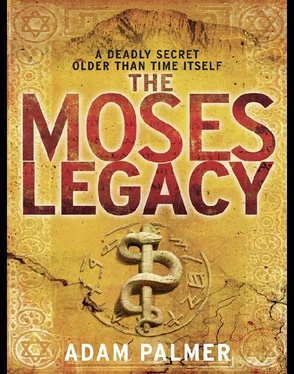Adam Palmer - The Moses Legacy
Здесь есть возможность читать онлайн «Adam Palmer - The Moses Legacy» — ознакомительный отрывок электронной книги совершенно бесплатно, а после прочтения отрывка купить полную версию. В некоторых случаях можно слушать аудио, скачать через торрент в формате fb2 и присутствует краткое содержание. Жанр: Триллер, на английском языке. Описание произведения, (предисловие) а так же отзывы посетителей доступны на портале библиотеки ЛибКат.
- Название:The Moses Legacy
- Автор:
- Жанр:
- Год:неизвестен
- ISBN:нет данных
- Рейтинг книги:4 / 5. Голосов: 1
-
Избранное:Добавить в избранное
- Отзывы:
-
Ваша оценка:
- 80
- 1
- 2
- 3
- 4
- 5
The Moses Legacy: краткое содержание, описание и аннотация
Предлагаем к чтению аннотацию, описание, краткое содержание или предисловие (зависит от того, что написал сам автор книги «The Moses Legacy»). Если вы не нашли необходимую информацию о книге — напишите в комментариях, мы постараемся отыскать её.
The Moses Legacy — читать онлайн ознакомительный отрывок
Ниже представлен текст книги, разбитый по страницам. Система сохранения места последней прочитанной страницы, позволяет с удобством читать онлайн бесплатно книгу «The Moses Legacy», без необходимости каждый раз заново искать на чём Вы остановились. Поставьте закладку, и сможете в любой момент перейти на страницу, на которой закончили чтение.
Интервал:
Закладка:
‘And if The Book of the Wars of the Lord still exists?’
‘Then…’ again Goliath pointed to Daniel, ‘that man can reveal the sacred truths that have remained hidden – even from your own ancestors – for over three thousand years.’
The sheikh leaned towards Goliath. Goliath had to move forward and crouch down to hear him. Ibrahim spoke, almost in a whisper.
‘It is not a scroll.’
‘Then what is it?’
The sheikh smiled, a bewitching smile, as if mocking the naivety of the big man. ‘Very few have set eyes upon it.’
‘And are you one of those few?’
‘Only once, when my father handed over to me the task of guarding it.’
‘Then let us see it,’ said Goliath, feigning the pleading voice of a man with good intentions. ‘And let my friend translate it.’
‘All right. I will show it to you.’
Chapter 88
‘I’m telling you – I didn’t do it!’ Sarit explained for the umpteenth time. ‘Look at his neck! You can see his throat’s been cut. Can you see any knife on me? Can you see any knife in the room?’
The two priests who had returned to find her standing there over the body, and the half dozen or so other people who had crowded into the room looked around. They could indeed see nothing resembling the type of weapon that had inflicted these wounds. But they had found her with blood on her clothes.
She knew that it was only a matter of time before the police got there, probably only a few minutes. But she saw the anger in the eyes of the younger priest, and she feared that she might have to resort to her krav maga fighting skills to defend herself. In fact, her fears were unfounded. He did not lift a finger against her.
‘Look,’ she said quietly, ‘there is something I need to know. Did either of you see a very tall man outside?’
They shook their heads.
‘I know that your high priest was here with two people to hear a translation of an ancient manuscript. Were you here when it happened?’
The two priests exchanged a glance. Finally the older one spoke.
‘We were listening to the translation, but my young colleague found it a bit stressful so he had to go outside. I followed him to see if he was all right and we stayed outside for a while. When we came back we found you standing over the body.’
‘But you didn’t see the man and the woman leaving?’
‘No.’
‘And you didn’t see a big man with them?’
Again they exchanged a glance. The younger priest shrugged.
‘No.’
Now Sarit understood. She remembered the empty holster of the dead guard outside and that said it all. They were being taken somewhere under duress. But where? She also realized that time was of the essence. With the police on their way, the shit was about to hit the fan.
She took out her mobile phone and called a number. ‘Hallo Dovi. I’ve got a bit of a problem.’
The Samaritan priests and the others who were congregating in the tiny space heard shouting from the other end of the phone, while Sarit tried to answer calmly. Meanwhile, the university’s own security guards had entered and were trying to keep people back.
The last words those who were in close proximity heard the man at the other end of the phone say were: ‘ Ahni baderech.’ Those of them who spoke Hebrew knew that this meant: I’m on my way.
It was evident when Sarit put the phone away that she was far from relieved. If anything, she looked more tense now than she did before the phone call.
She looked down at the body once again, not really knowing why. Was it a sense of regret, knowing that she hadn’t got here soon enough? Was it a sense of guilt that she hadn’t confided her suspicions to Dov as to where the person who killed Aryeh Tsedaka was likely to be going? Or was it a sense of anger at the waste of life and the obvious viciousness of the killer?
She was not supposed to let her emotions get the better of her. In her line of work one had to develop a stomach for blood and suppress one’s emotions if there was even the slightest chance that they would interfere with the job. But still she looked at the body, lying there face down in that pool of blood. She noticed the crooked finger of his extended right arm that reached beyond the pool of blood. And she noticed something else. The finger had blood on it – just the end of the finger, above the last articulation – as if he had been writing with his own blood.
She knew that she shouldn’t interfere with the body until it had been pronounced dead by the coroner and then photographed in situ by the investigating officers. She also knew that to approach the body and touch it would contaminate the crime scene, making it harder for the forensic scientists to obtain useful evidence and making it easier for any defence lawyer to undermine that evidence. But right now the immediate priority was not preserving evidence: it was preserving something infinitely more valuable.
She went up to the body, clambered over to the other side and crouched down, peering at it, as if trying to see what was underneath it. But she couldn’t see clearly and she knew now that time was of the essence. So she inserted both her hands on the underside of the body, palms upward. Then she lifted one side of the body, twisted her hands round and gave an almighty push, rolling the body over on to its back.
Some members of the crowd gasped in surprise but Sarit had no interest in their reaction, nor indeed any in the state of the body. She was only interested in what was underneath the body, and that appeared to be a very specific bloodstain on the floor – too purposeful to be random or accidental. It was an arrow drawn in blood. And the arrow pointed to four Hebrew letters.
She realized now what had happened. In his dying seconds, even as the life drained out of him, he had drawn the arrow and written the letters in the only thing he had available: his own blood. But then, in order to ensure that it wasn’t drowned out by the blood that was gushing from his throat, he covered it with his body and was, in the words of the Bible, gathered to his people.
But it was the letters that interested Sarit now. There were just four of them, and interestingly they were in Hebrew – possibly an indication of who they were intended for. They were the letters Pay, Tet, Reish and Hay. The equivalent of the consonants P-T-R-H.
There was no doubt in her mind what this man was trying to say in his final message. The arrow was an indication that someone was going somewhere. And the letters stood for the name Petra.
Chapter 89
‘There’s something I don’t understand,’ said Goliath as they clambered up the steep slopes and over craggy rocks on their long trek. ‘The Nabateans were in the sixth century BC, but the ancient Israelites were a lot older than that. I think they entered the land of Canaan in something like the twelfth century BC. So why would The Book of the Wars of the Lord be here?’
Sheikh Ibrahim smiled. ‘We’re not actually going to the city of Petra. That’s why we didn’t go through the siq. You have to understand that people lived in this area as nomads as far back as 7,000 years before Jesus. The first people to actually settle here did so around 3,200 years ago.’
‘That was just after the Amarna period,’ Gabrielle proffered. ‘Although I think this place is even mentioned in the Amarna letters.’
‘Exactly,’ said Ibrahim. ‘And this is reflected in some of the names. For example, that is Pharaoh’s Column.’
He pointed to a cylindrical column of red rock in the distance. They looked briefly, but stopping and admiring the scenery was almost as tiring as walking, not physically but psychologically, because it kept them further from their goal. So they trudged on, not fully appreciating the explosion of colour – running the entire gamut of the rainbow – that was written across the landscape in solid rock.
Читать дальшеИнтервал:
Закладка:
Похожие книги на «The Moses Legacy»
Представляем Вашему вниманию похожие книги на «The Moses Legacy» списком для выбора. Мы отобрали схожую по названию и смыслу литературу в надежде предоставить читателям больше вариантов отыскать новые, интересные, ещё непрочитанные произведения.
Обсуждение, отзывы о книге «The Moses Legacy» и просто собственные мнения читателей. Оставьте ваши комментарии, напишите, что Вы думаете о произведении, его смысле или главных героях. Укажите что конкретно понравилось, а что нет, и почему Вы так считаете.












